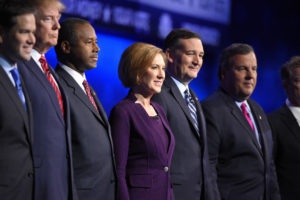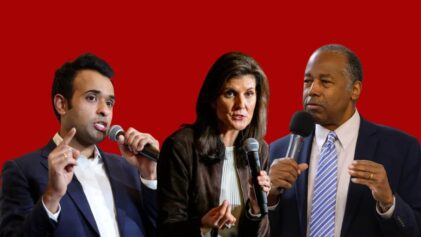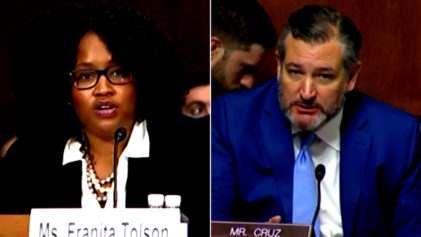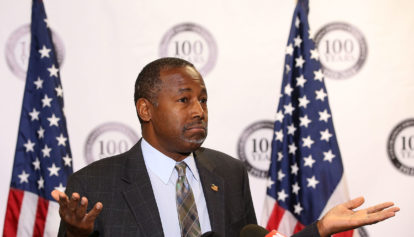
Republican presidential candidates, from left, Marco Rubio, Donald Trump, Ben Carson, Carly Fiorina, Ted Cruz, and Chris Christie take the stage during the CNBC Republican presidential debate at the University of Colorado, Wednesday, Oct. 28, 2015, in Boulder, Colo. (AP Photo/Mark J. Terrill)
In the 2016 election campaign season, an emerging bipartisan consensus for criminal justice reform opens up the possibilities for true change. For example, a bill in the Senate, the Sentencing Reform and Corrections Act, would reduce the federal mandatory minimum and life without parole sentences for nonviolent drug offenders. This would be a considerable, though not complete, effort to undo the draconian measures enacted during the war on drugs. Yet, despite this, Republicans are wary in their response to #BlackLivesMatter, a Black-led protest movement formed after the death of Trayvon Martin which has grown in strength and helped direct and shape the national conversation on race and criminal justice.
To be sure, Democrats have experienced challenges in their dealings and interactions with #BlackLivesMatter. However, as The Guardian reports, candidates are reacting in different ways to the movement, and how each party responds to the activists will have an impact on Black voter turnout in the general election.
For Republicans, the challenges are clear, given a virtually all-white primary electorate which appears generally hostile to Black people. Despite the need for GOP outreach in communities of color in order to make up for Mitt Romney’s paltry 6 percent African-American support in 2012, and to establish long-term viability as a national party in an increasingly majority-Black and Brown country, discussions about race are awkward and fraught with danger in the former party of Lincoln.
#BlackLivesMatter activists are focusing most of their efforts on engagement with Democratic candidates, reflecting the Republicans’ inability to engage with the Black community.
“It would be almost a waste of our time,” Elle Lucier, co-founder of #ItsBiggerThanYou, a Black Lives Matter-affiliated grassroots organization, told The Guardian. “I’m not surprised that conservatives are using degrading language or demeaning the movement. That’s why we are having these conversations and we are forcing this dialogue with Democrats: because we’d have a chance to actually reach them.”
A number of Republican presidential rivals have chosen to deal with the Black-led reform movement through demonization and scapegoating. For example, New Jersey Gov. Chris Christie, who is polling far to the rear of the pack and is perceived as having no realistic chance of winning the GOP nomination at this point, said that #BlackLivesMater activists “advocate for the murder of police officers” and are creating a climate that places the lives of officers at risk. In a similar vein, Sen. Ted Cruz (R-TX) has cited the movement as a part of the new so-called “anti-police culture” created by President Obama which is placing the lives of police in danger. Conservative voices echo this narrative, despite the complete absence of evidence, making Black activists the bogeyman for daring to sound the alarm on the police violence against Black bodies in America.
Sen. Rand Paul (R-KY), who has been more supportive of criminal justice reform, spoken out against policing in communities of color, and called mass incarceration the new Jim Crow, has said in a patronizing tone that the movement should change its name to “All Lives Matter” or “Innocent Lives Matter.”
Former Florida Gov. Jeb Bush commented on former Maryland Governor and Democratic presidential candidate Martin O’Malley’s statement that “white lives matter, all lives matter.”
“I know in the political context it’s a slogan,” Bush said. “Should he have apologized? No. If he believes that white lives matter, which I hope he does, then he shouldn’t apologize to a group that seemed to disagree with it.”
Ben Carson, who is polling in second place among the GOP contenders, and in first in some polls, called the movement “silly” and its motto “sickening.” He claimed the group is forcing itself on people, rather than engaging in dialogue and “bullying people.”
“I never liked the idea of bullying on behalf of anybody,” he said. The former neurosurgeon also suggested that the movement remove the word “Black” from its title.
On the other hand, Sen. Marco Rubio (R-FL) , seen as a viable opponent to Hillary Clinton, has had more of a nuanced position on the matter. For instance, he characterized the concerns from African-Americans and others concerning the police “a legitimate issue.” However, Rubio is treading a fine line on his stance.
“The overwhelming and vast majority of law enforcement officers in this country are just trying to do their jobs,” he told Fox News’ Bill O’Reilly. “They’re the only things standing between my family and danger. They’re the first people we call when we get in trouble. It is troubling that there are groups and rhetoric out there now that is encouraging people to demonize law enforcement, to target law enforcement or in some cases, quite frankly, to misrepresent what law enforcement is trying to do.”
For that reason, Rubio is only one of two candidates—along with Carson, interestingly– approached by #BlackLivesMatter activists.
Meanwhile, writing for Huffington Post Black Voices, Angela James, associate professor of African American Studies at Loyola Marymount University, noted that the #BlackLivesMatter movement, much more than a slogan, has carried Dr. King’s mantle that “none of us are free until all of us are free.” And in the process, the movement has proven difficult for politicians to contain. James notes that the growing grassroots movement has been unapologetic about proclaiming the humanity of Black people. She maintains the group has “rapidly reclaimed ideological territory lost in the wilderness of ‘respectability politics’ and color-blind rhetoric.”
“Using tactics criticized by government officials, political elites, and the media, ‘Black Lives Matter’ has snatched away the façade of colorblindness, and in doing so laid bare for the world to see, that our central institutions operate as those Black Lives DON’T matter,” she said.


